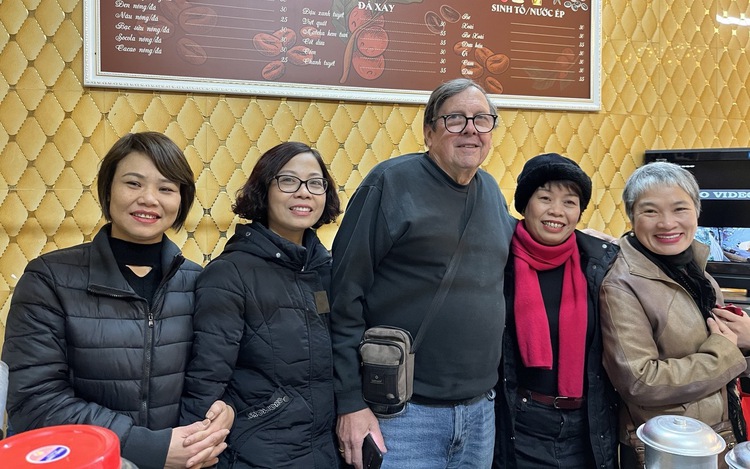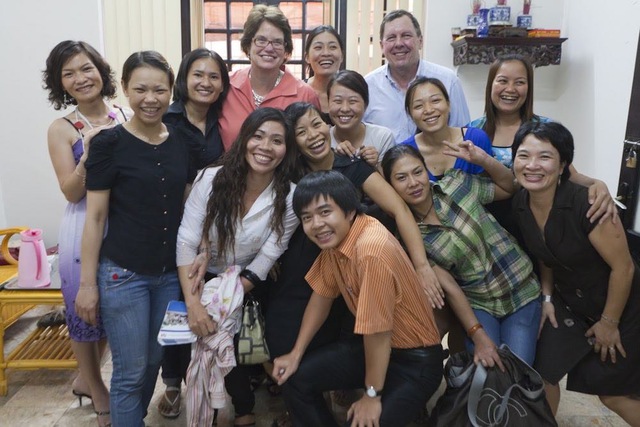
Ted Hammett (C) reunites with staff from an HIV prevention project in Vietnam in 2023, 16 years after the program began. Dr. Khuat Thi Hai Oanh is seen far right. Photo provided by Ted Hammett
Now 79, Hammett has returned to Vietnam once again, this time to mark the 50th anniversary of the end of the American war and the reunification of Vietnam.
His feelings toward the country, he says, can be summed up in one word: love.
A story that began in 1966
Hammett’s journey with Vietnam began in 1966 while he was still a student at Harvard University.
As the son of a U.S. Marine who fought in World War II, it was expected that he would follow in his father’s footsteps.
His father was clear: Hammett would serve in the military—and in Vietnam.
But Hammett opposed the war.
He hated what America was doing in Vietnam and refused to enlist, much to his father’s dismay.
His refusal was seen as a betrayal, and his father threatened to cut off financial support for his education.
Under pressure, Hammett gave in.
In 1968, a year after graduating, he was deployed to Quang Tri Province in north-central Vietnam, where he served as a supply officer at a field hospital until 1969.
Struggling with forced duty
Hammett’s time in Vietnam left him feeling conflicted and resentful.
“I didn’t actually fight in combat,” he said, “but I saw the devastating effects of the war.”
He returned home with anger, not just toward the war, but toward everything it represented.
It was not until he came back to Vietnam in 1997 as a tourist that his perspective began to shift.
Over time, that anger gave way to reflection and guilt.
He came to view the war as a senseless invasion and saw his role, however indirect, as complicit in the suffering of the Vietnamese people.
That guilt inspired him, like many veterans, to find a way to give back.
Returning and overcoming fear
After his 1997 visit, Hammett returned to Vietnam multiple times.
Over the next 15 years, he dedicated himself to HIV/AIDS prevention and treatment programs, even relocating to Hanoi for three and a half years.
“I fell in love with this country and its people. It felt like a second home,” he said.
His first return was filled with uncertainty.
Like many U.S. veterans, he feared resentment from the Vietnamese.
But the reception he received surprised him.
“There was almost no hostility. Everyone was welcoming,” he recalled.
That same year, during a visit to China for an HIV/AIDS conference, he met a Vietnamese colleague and began exploring opportunities to work in Vietnam.
By 2001, he had begun contributing to public health efforts full-time.

Ted Hammett (back row, far right) poses with local staff and participants during a health project in Vietnam in 2011. Photo provided by Ted Hammett
Building a bridge through public health
One of Hammett’s earliest projects involved distributing clean syringes to drug users in northern Lang Son and Ha Giang Provinces to prevent the spread of HIV.
“It was very successful in reducing HIV rates among drug users,” he said.
In 2008, Hammett and his team secured a USAID-funded initiative called the Vietnam Health Policy Initiative, which focused on strengthening HIV/AIDS policy.
That same year, he relocated to Hanoi to lead the project.
Through this work, he collaborated closely with health officials, NGOs, and local volunteers.
Today, he points to Vietnam’s social health insurance system—which now covers HIV treatment—as a major success.
“I believe all Vietnamese who need HIV/AIDS treatment can now access it,” he said.
A life dedicated to healing
Dr. Khuat Thi Hai Oanh, director of the Institute for Social Development Studies, has worked alongside Hammett on several initiatives.
In 2007, they recognized a gap in HIV prevention: protecting the spouses of drug users.
Together, they created a program that has since helped thousands of women avoid HIV infection.
“What makes me happiest is that these women, once marginalized, have now built a supportive community,” Dr. Oanh said.
Many participants have gone on to build new lives, and some even have children in university.
One woman, trafficked into prostitution at age 11, eventually married and had a family. Hammett even attended her wedding.
Dr. Oanh, whose father was a Vietnamese general during the war, remembers how Hammett once helped her track down archival material about a famous battle her father had fought in.
“Ted has devoted nearly 20 years to supporting Vietnam through public health. He truly loves this country,” she said.
A personal mission
Today, Hammett’s commitment to Vietnam remains as strong as ever.
Nearing 80, he continues to visit annually, contributing to programs aimed at healing old wounds.
“The work I’ve done over the last 20 years has helped me understand Vietnam, and it’s why I love this country so much,” he said.
For Hammett, this is more than a career.
It is a personal mission—one rooted in reconciliation, healing, and an enduring love for a country he once arrived in under very different circumstances.


Max: 1500 characters
There are no comments yet. Be the first to comment.